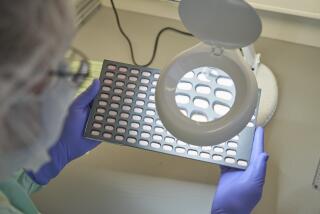Pfizer closes in on Wyeth deal
- Share via
NEW YORK — Pfizer Inc. would pay about $68 billion to acquire Wyeth in a bid reviewed Sunday by boards for the two drug companies, according to people familiar with the talks.
The New York Times and the Wall Street Journal reported that the deal could be announced before the markets open today.
Wyeth shareholders would get $50.19, including $33 in cash and 0.985 Pfizer shares, one source said. That’s a 29% premium on Wyeth’s price Thursday, before word of the talks became public. Pfizer Chief Executive Jeffrey Kindler would lead the combined company, two sources said.
Pfizer, the world’s biggest drug maker, would gain the depression treatment Effexor and pneumonia vaccine Prevnar in the transaction, and could raise its annual sales by 46%, to $70 billion. That would help the New York-based company offset some of the $12 billion in revenue it will begin losing in 2011 when the Lipitor cholesterol pill’s patent expires.
Pfizer’s labs weren’t able to create enough drugs to replace the Lipitor revenue, Les Funtleyder, an analyst with Miller Tabak & Co. in New York, said in an interview last week. As that became more obvious, Pfizer officials decided they had to do something. They could have decided to let the company get smaller as Lipitor diminished. Instead, they chose to get bigger.
The $50.19-a-share price values the transaction at $66.8 billion for Wyeth’s outstanding shares as of Oct. 31. The figure will be slightly higher when Wyeth employee stock options are converted into stock when the transaction is completed.
Pfizer spokesman Ray Kerins and Wyeth spokesman Dan McIntyre could not be reached for comment.
The combined company would have 130,000 employees, and its annual revenue would be 55% more than the world’s second-biggest drug maker, London-based GlaxoSmithKline, which has said it will focus on smaller purchases in the year ahead.
The Wyeth transaction carries both promise and peril for Pfizer, analysts and investors said in interviews since the talks were first reported by the Wall Street Journal last week.
The deal could keep Pfizer’s earnings unchanged at $2.69 a share from 2010 to 2015, when patents expire on some of Pfizer’s biggest products, said Tim Anderson, an analyst with Sanford C. Bernstein in New York, in a research report. That compares to a 68% drop without the acquisition, to $1.40 in 2015.
To achieve that, Pfizer would need to cut 70% of Wyeth’s research, marketing and administrative costs, Anderson said.
Pfizer also would get partial rights to the experimental Alzheimer’s disease treatment bapineuzumab, which some analysts have said could generate $8 billion in peak annual sales by 2015 if approved.
Pfizer also would inherit Wyeth’s legal woes.
Wyeth, based in Madison, N.J., is facing claims by more than 10,000 women in the U.S. who contend that its hormone replacement drugs Prempro and Premarin cause breast cancer. Wyeth has also set aside $21 billion to resolve a decade of litigation over its fen-phen diet pill, pulled off the market in 1997 after being linked to heart damage and lung disease.
More to Read
Inside the business of entertainment
The Wide Shot brings you news, analysis and insights on everything from streaming wars to production — and what it all means for the future.
You may occasionally receive promotional content from the Los Angeles Times.










